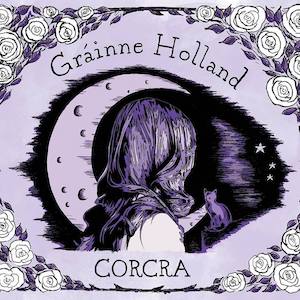 Gráinne Holland – Corcra
Gráinne Holland – Corcra
Self Released – 1 February 2019
This is the third album from Irish singer/songwriter Gráinne Holland, and the first featuring her own original work. The album showcases her versatility as a singer and the songs, which are very personal, are rooted in Irish traditional music but with a very modern contemporary feel.
Unfortunately, the lyrics were not available with the CD, but they are promised on her website: this, however, does not impact on the enjoyment of the songs as there is a brief explanation of each one and the music does the rest.
Mise agus Tusa (Me and You) is a surprise. A love song for her husband but as far removed from the syrupy love songs we might have imagined as it is possible to be. It starts with a highly percussive, fiddle-led riff in jig time before the vocal, overdubbed from the start places itself perfectly over the insistent backing. Producer and flautist Brian Finnegan (Flook) uses the song to introduce us to the instrumental themes for the rest of the album. Lots of whistle and flute which in this song reminds me of Jethro Tull. One of the joys of getting older is spotting influences; intended, unintended or merely coincidental.
The next song “Coinsias, Corp agus Croi” is the polar opposite of the first. It’s haunting, beautifully sung, sad and redemptive. The recording is exemplary and as the production builds it takes a few listens until you become aware that, yes that is a trombone! Soaring whistle, more gorgeous overdubbed vocals and you don’t need to understand the lyrics to feel the anguish. The percussion of Liam Bradley, the whistle, trombone all imaginatively assembled by Finnegan.
“Lon Dubh an Gheimhridh” is another melancholy song; none the worse for that. Lots of people feel sadness as autumn turns to winter and life shuts down. The climate might have something to do with it. The Gaelic language is made for sad songs and again the combination of beautiful singing and well-chosen instrumentation reveal the sentiment of the song.
Gráinne Holland is, obviously, bi-lingual, and a product of the first Irish Medium school in Belfast. The album is partially funded by the lottery through the arts council and when the result of that investment is perfect music such as this it is impossible to argue with investment in traditional music. It allows artists to attract the best musicians to their projects and on this album, you find Aiden O’Rourke of Lau contributing fiddle and bringing a Scottish dimension to a very Irish album.
If you write, as Gráinne does, personal songs from the heart there is always a risk of a record being one-dimensional. “Corcra” is beautifully balanced. After two downbeat songs “Ni Chluinim, Ni Fheicim” in the writer’s own words focuses on the positive. Very traditional sounding, great Bodhran playing from John Joe Kelly, more lovely flute and you definitely feel uplifted by the end of it.
“Goodbye Love” is the first song in English and is a very modern song with piano, trombone and lots of subtle flute and fiddle. Gráinne chooses to sing this one without traditional ornamentation but every so often her accent is discernible which adds extra charm.
“Harry’s is a very traditional sounding lament for her father, written shortly after his death. In this one, a Gaelic refrain is used which works very well. Again, the percussion is imaginative and effective with whistle and flute adding an ethereal sorrow to the lament. Written and performed in the Irish idiom this is a lovely tribute to a loved one.
Written when Gráinne left to move to the countryside “Beal Feirste” is an upbeat tribute to Belfast. It is followed by “Empty” which is probably the least traditional song on the album; a love song showcasing the musicians’ effortless ability to switch genres.
“An Ri Rua” tells the story of “two little birds who died after flying into Gráinne’s window”. It is written in collaboration with Brian Finnegan and Frainne MacCionnaith. As on every song on the album the musicianship is perfect and the singing, overdubbed, is beautiful.
The final song on Corcra is “Miracle” which is in English and written for Gráinne’s son. You can’t fail to empathise with it and if not it’s still a lovely song, perfectly performed and recorded. The trombone of Paul Dunlea is simply beautiful and the guitar and piano, Sean Og Graham and Cormac MacCarthy, is understated and effective as it is throughout the album.
The care taken in the recording of Corcra is definitely part of its charm. In the quiet songs, you feel as if you are in the front room being given a private audience. In the more upbeat songs, you can turn up the volume and imagine you’re at a gig or a festival with the band rocking while you deal with a pint of Guinness. The material is strong and the singing and instrumentation are exceptional.
It’s a tribute to the work being put into traditional music on both sides of the Irish Sea that so many artists are writing in Gaelic. Gaelic is a living language and if it is not nurtured a major part of Scottish and Irish heritage will be lost. By writing in Gaelic modern artists give legitimacy to the language and are able to express sentiment and story often better than they would in another language. This album is modern, fresh and timeless.
I’m looking forward to the next chapter.
https://www.grainneholland.com/

